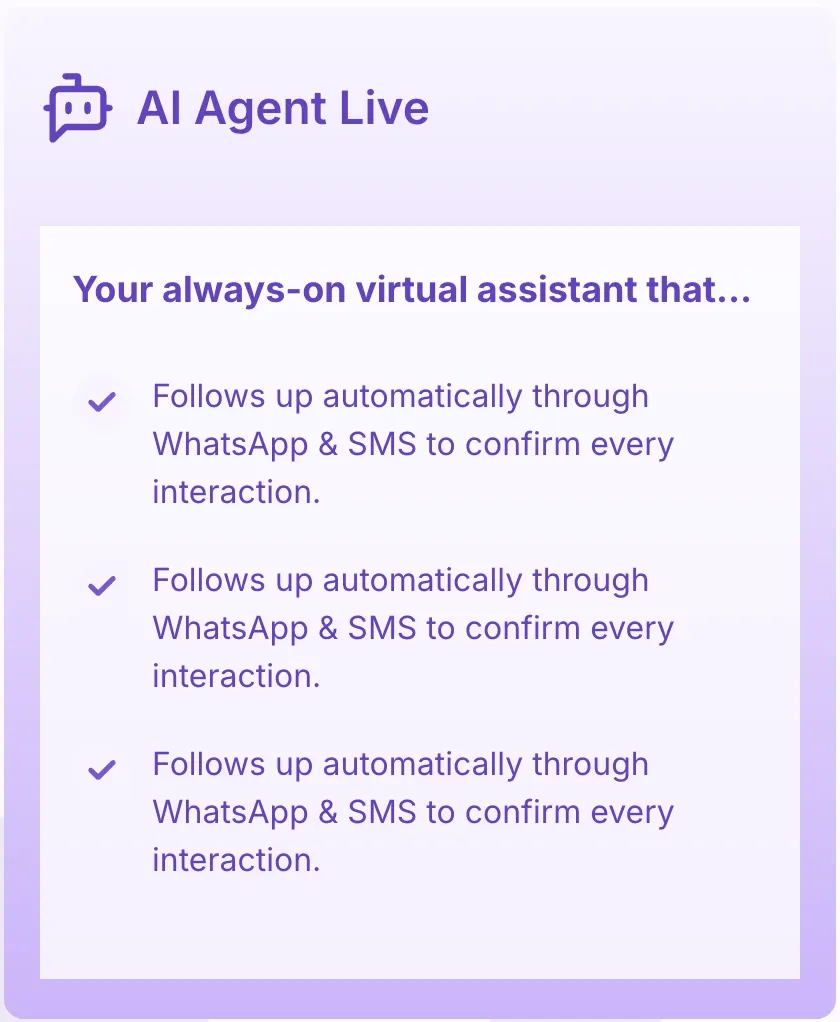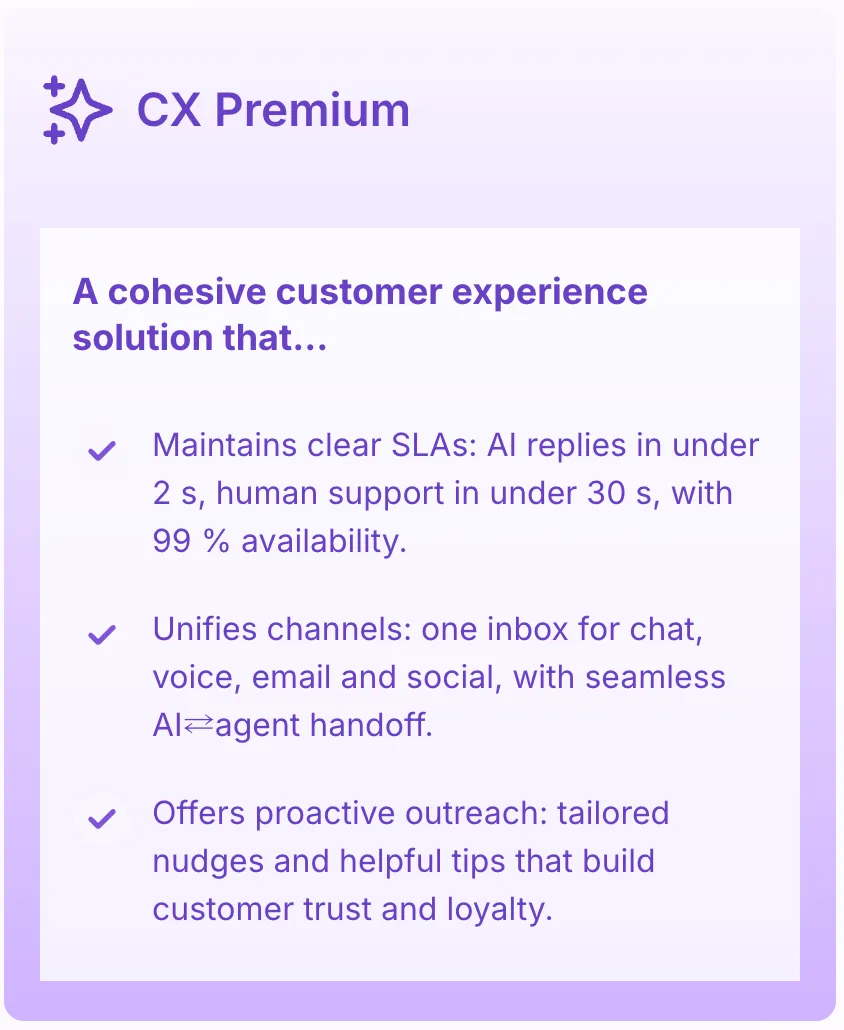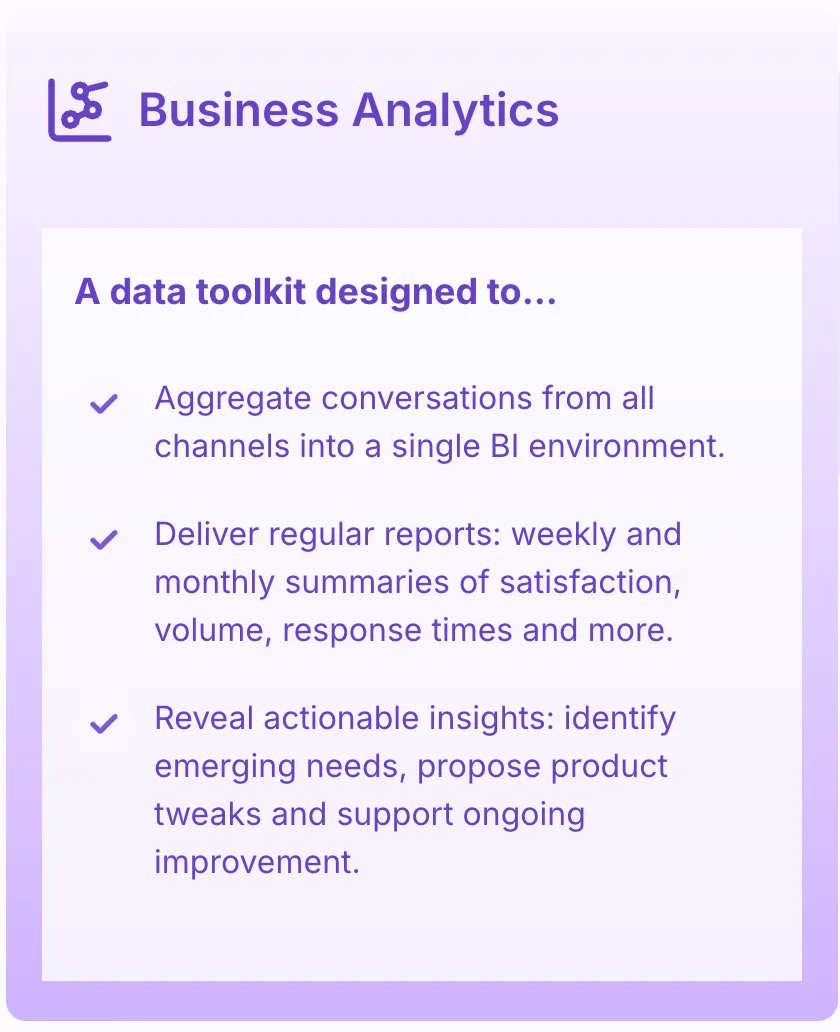The way customers interact with brands has changed significantly due to the rise of digital technology. Currently, there are approximately 3.78 billion social media users globally who expect immediate responses and personalized attention when they contact businesses online. This shift in customer behavior has made social media customer service an essential part of a brand's success.
Why is social media customer service important?
Here are some key reasons why social media customer support is crucial for businesses:
- Cost-effective: Supporting customers through social media is much cheaper than traditional phone support methods.
- Broader reach: Brands can assist multiple customers at once by having public conversations on social media.
- Instant engagement: Social media allows for quick responses, which is what modern customers expect.
- Brand visibility: When businesses interact with customers publicly on social media, it shows their commitment to customer satisfaction.
- Valuable insights: Brands can directly access feedback from customers and analyze their sentiments through social media.
Your brand's presence on social media represents your commitment to providing excellent customer service. Every interaction with a customer becomes an opportunity to showcase your values, earn trust, and create positive experiences that customers will share with others.
The true power of social media customer service lies in its ability to transform ordinary support interactions into moments that strengthen your brand and resonate with your entire online community.

The Impact of Social Media Customer Service
Social media has transformed the way brands and consumers interact. With 3.78 billion active social media users worldwide, these platforms have become essential for customer support.
The Power of Social Media on Customer Satisfaction
Recent data reveals striking statistics about social media's impact on customer satisfaction:
- 76% of customers expect a response within 24 hours on social media
- Companies that provide excellent social media support see a 92% customer retention rate
- Social media customer service costs are 12x lower than traditional phone support
Gen Z: Reshaping Customer Service Expectations
Gen Z's digital-first mindset drives significant changes in customer service trends:
- 60% prefer solving issues through social media channels
- 75% expect personalized interactions with brands
- 82% trust companies that show authentic social media presence
Their preferences have pushed brands to adopt:
- Real-time response capabilities
- Video-based support options
- Interactive problem-solving approaches
Forrester's Research Insights
Forrester's analysis highlights social media's critical role in building customer loyalty:
"One-third of American consumers use social media to voice complaints about brands, making effective social response crucial for reputation management"
The research identifies key factors driving customer loyalty through social media:
- Swift response times (under 60 minutes)
- Personalized interaction approaches
- Public resolution of issues
- Proactive engagement with customer feedback
Brands implementing these strategies report:
- 29% increase in customer satisfaction scores
- 42% improvement in brand perception
- 37% higher customer retention rates
Strategies for Effective Social Media Customer Support
1. Proactive Issue Resolution with Social Listening
Social listening tools enable brands to catch customer concerns before they escalate into major issues. By monitoring brand mentions, hashtags, and relevant keywords, you can identify potential problems and address them proactively. Tools like Sprout Social and Mention help track conversations about your brand across multiple platforms, providing valuable insights into customer sentiment and emerging trends.
2. Automation: The Smart Way to Scale
- AI-powered chatbots handle routine inquiries 24/7
- Auto-routing systems direct complex issues to specialized teams
- Smart response suggestions speed up reply times
- Sentiment analysis tools flag urgent cases for immediate attention
The key lies in striking the right balance between automation and human touch. Your automated responses should sound natural and personalized, while complex issues receive dedicated human attention.
3. Building a Strong Community Management Framework
A robust community management strategy transforms casual customers into brand advocates. Here's what works:
- Create dedicated support channels on each platform
- Establish clear response guidelines for different types of inquiries
- Train support teams on brand voice and personality
- Develop escalation protocols for sensitive issues
4. Engagement Best Practices
- Respond within 1 hour during business hours
- Address customers by name
- Use empathy in your responses
- Follow up on resolved issues
- Share positive customer experiences
Your community managers should act as brand ambassadors, fostering meaningful connections with customers. Regular engagement through polls, questions, and user-generated content keeps your community active and invested in your brand.
Remember to document successful resolution strategies and share them across your support team. This knowledge base becomes invaluable as your social media presence grows and customer interactions increase.
Handling Customer Interactions on Social Media with Care
Your brand's personality shapes how customers perceive and connect with your business on social media. A consistent brand voice across platforms helps build trust and recognition, while still allowing room for platform-specific adaptations.
Platform-Specific Brand Voice Examples:
- LinkedIn: Professional yet approachable
- Instagram: Visual and conversational
- Twitter: Quick-witted and concise
- Facebook: Casual and community-focused
When managing negative comments, a strategic approach helps maintain your brand's reputation while addressing customer concerns effectively.
Best Practices for Handling Negative Feedback:
- Respond promptly - aim for a 1-hour response time during business hours
- Move heated discussions to private channels
- Acknowledge the issue publicly before taking it private
- Maintain professionalism even when faced with hostility
- Document all interactions for future reference
Creating Response Templates:
[Customer Name], we understand your frustration about [specific issue]. We'd like to help resolve this. Please DM us your order number so we can assist you further.
Public backlash requires special handling to protect your brand image. Consider these proven strategies:
- Issue a clear, direct statement addressing the concern
- Share updates on resolution progress
- Highlight positive changes implemented
- Engage with supportive customers
- Monitor conversations using social listening tools
Remember to customize your approach based on the severity of the situation and the platform where the interaction occurs. A minor complaint on Twitter might need a different response strategy than a serious issue raised on Facebook.

Tools and Technologies for Efficient Social Media Support Operations
Social media monitoring tools are essential for brands looking to streamline their customer support operations. Here's a look at popular tools and their standout features:
Popular Social Media Monitoring Tools
- Hootsuite: Unified dashboard for multiple platforms, real-time monitoring, team collaboration
- Sprout Social: Advanced analytics, smart inbox, automated response suggestions
- Mention: Real-time brand monitoring, sentiment analysis, competitor tracking
- Buffer: Scheduling capabilities, engagement tracking, performance analytics
- Brandwatch: Advanced social listening, market research, trend analysis
Key Features to Look For
- Real-time monitoring and alerts
- Sentiment analysis capabilities
- Multi-platform integration
- Team collaboration tools
- Custom reporting options
Automation brings significant benefits to social media customer service:
Benefits of Automation
- 24/7 instant responses
- Reduced response times
- Consistent brand messaging
- Cost-effective operations
- Scalable support solutions
However, there are also challenges that come with automation:
Automation Challenges
- Risk of impersonal interactions
- Complex setup requirements
- Need for regular updates
- Potential misinterpretation of customer queries
- Balance between automated and human responses
The integration of AI-powered chatbots with social media platforms enables brands to handle routine inquiries automatically while directing complex issues to human agents. This hybrid approach maintains efficiency without sacrificing the personal touch customers expect.
Enhancing Brand Reputation Through Timely Responses and Escalation Management on Social Media Channels
Quick response times on social media directly impact your brand's reputation. Research shows 42% of customers expect a response within 60 minutes on social platforms. Meeting these expectations builds trust and shows your commitment to customer satisfaction.
Creating an Effective Response Strategy:
- Set up real-time notifications for brand mentions
- Establish dedicated social media response teams
- Create pre-approved response templates for common issues
- Track response times across platforms
A well-structured escalation matrix ensures complex issues receive appropriate attention. Your matrix should include:
- Level 1: Basic queries handled by frontline social media team
- Level 2: Technical issues directed to specialized support staff
- Level 3: Critical concerns escalated to management
- Level 4: Crisis situations requiring immediate executive attention
Response Time Guidelines:
- Simple queries: 0-30 minutes
- Complex issues: Within 2 hours
- Critical situations: Immediate acknowledgment
Implementing a clear escalation process helps prevent issues from escalating into public relations crises. Your support team needs defined triggers for escalation:
- Multiple complaints about the same issue
- Negative comments from influential accounts
- Legal or compliance-related concerns
- Potential reputation threats
Track your response metrics and adjust your strategy based on performance data. This approach helps maintain consistent service quality while protecting your brand's online reputation.
Comparing Traditional vs. Social Media Customer Service Channels: A Case for Modernization
Social media customer service delivers significant advantages over traditional support channels. Research shows social media support costs 12 times less than phone-based customer service, making it a cost-effective solution for businesses of all sizes.
The Reach Potential of Social Media
The potential reach through social media platforms is unparalleled:
- Instant access to 3.78 billion global users
- 24/7 availability without additional staffing costs
- Multi-language support capabilities through built-in translation tools
- Scalable solutions that grow with your customer base
Opportunities for Real-Time Engagement
Real-time engagement on social platforms creates opportunities for:
- Public resolution of issues, showcasing your brand's commitment to customer satisfaction
- Direct messaging for sensitive matters requiring private attention
- Quick sharing of visual content, tutorials, and helpful resources
- Building community through peer-to-peer support in comments
Data-Driven Improvement with Analytics Tools
Social media platforms also offer powerful analytics tools, helping you track response times, customer satisfaction rates, and common issues. This data-driven approach enables continuous improvement of your support strategy while maintaining lower operational costs compared to traditional call centers or email support systems.

Case Study: Nestle's Maggi Crisis Management - A Lesson in Crisis Communication Excellence on Social Media Platforms
The 2015 Maggi noodles controversy in India presented Nestle with an unprecedented social media crisis. The brand faced intense public scrutiny when reports emerged about unsafe lead levels in their popular instant noodles.
Nestle's response demonstrated exemplary crisis management through social media:
1. Swift Response Strategy:
- Immediate establishment of a dedicated social media response team
- Creation of #WeMissYouToo campaign to maintain emotional connection with consumers
- Regular updates through branded social channels about product testing and safety measures
2. Strategic Influencer Engagement:
- Collaboration with food bloggers and nutrition experts
- Live demonstrations of manufacturing processes
- Transparent sharing of laboratory test results
3. Community Management Approach:
- Personal responses to consumer concerns on Twitter and Facebook
- Educational content about food safety standards
- Regular engagement with brand advocates
The brand's proactive social media strategy helped rebuild trust through:
- Real-time updates on regulatory compliance
- Direct communication with concerned customers
- Transparent sharing of product information
Nestle's handling of the Maggi crisis showcases how brands can leverage social media during challenging times. Their approach combined transparency, swift action, and strategic influencer partnerships to maintain brand credibility and customer trust.
Conclusion
Social media customer service shapes the modern brand-customer relationship. The direct, public nature of these interactions creates unprecedented opportunities for building brand integrity and fostering customer trust.
Key takeaways for businesses:
- Swift response times and personalized interactions demonstrate your commitment to customer satisfaction
- Social platforms offer cost-effective solutions for scaling customer support operations
- Proactive engagement helps prevent potential crises and strengthens brand reputation
- Strategic use of automation balances efficiency with authentic human connection
Your brand's success depends on meeting customers where they are - on social media. By implementing robust social customer service strategies, you'll create meaningful connections, drive customer loyalty, and establish your brand as a trusted industry leader.
Ready to transform your customer service approach? Start by auditing your current social media response systems and identifying areas for improvement. Your customers are waiting to engage with you on social platforms - make every interaction count.
FAQs (Frequently Asked Questions)
What is social media customer service and why is it important ?
Social media customer service refers to providing support and assistance to customers through social media platforms. It is important because it enables businesses to engage with customers in real-time, address issues promptly, and build stronger brand loyalty by leveraging the widespread use of social media.
How does Gen Z influence customer service trends on social media ?
Gen Z significantly shapes customer service trends by expecting quick, personalized, and transparent interactions on social media. Their digital-native behavior drives companies to adopt innovative strategies like automation and proactive social listening to meet these evolving expectations effectively.
What strategies can businesses use for effective social media customer support ?
Effective strategies include proactive social listening to monitor customer feedback, leveraging automation tools to streamline interactions without losing personalization, and developing a robust community management approach that fosters brand loyalty and encourages advocate engagement.
How should brands handle negative comments on social media while maintaining their brand personality ?
Brands should maintain a consistent brand personality across platforms by responding calmly and professionally to negative comments. Practical strategies involve acknowledging concerns promptly, offering solutions publicly or privately as appropriate, and using negative feedback as an opportunity to demonstrate commitment to customer satisfaction.
What tools and technologies enhance efficiency in social media support operations ?
Popular social media monitoring tools help track conversations and sentiment around a brand. Automation technologies improve response times by handling routine inquiries efficiently. Together, these tools enable teams to deliver timely, personalized support while managing large volumes of interactions effectively.
Why is timely response and escalation management critical for brand reputation on social media ?
Swift responses build trust and credibility by showing customers their concerns are valued. Implementing an escalation matrix ensures complex issues are addressed at appropriate levels promptly, preventing dissatisfaction from escalating and protecting the brand's reputation in the public eye.













Member discussion